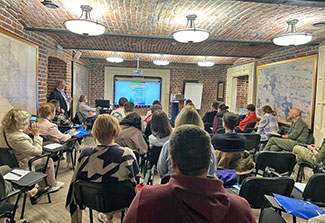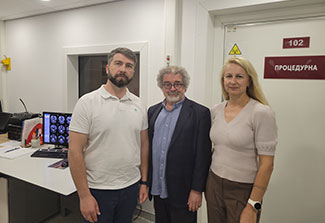Bringing evidence-based care to Ukrainians suffering from PTSD
September/October 2023 | Volume 22 Number 5
 Photo courtesy of Tetiana NickelsenDr. Tetiana Nickelsen teaches a class in a bunker in Kyiv, Ukraine. Trainees in the Fogarty-funded program learn about evidence-based care for PTSD.
Photo courtesy of Tetiana NickelsenDr. Tetiana Nickelsen teaches a class in a bunker in Kyiv, Ukraine. Trainees in the Fogarty-funded program learn about evidence-based care for PTSD.
By Susan Scutti
Up to a third of Ukrainians, both civilian and military, suffered from post-traumatic stress disorder (PTSD) during the country’s 2014-21 conflict with Russia, as estimated by the UN. Since the Russian invasion in February 2022, millions more have been exposed to combat and war-related traumas. Yet very few of the nation’s mental health care professionals have trained in evidence-based treatment for these conditions. A Fogarty-funded project aims to change that.
"PTSD is one of the most common mental health disorders,” says Dr. Israel Liberzon, Texas A&M University (TAMU). For patients who experience comorbidities, such as anxiety, depression or even suicidal ideation, it can cause dysfunction and become completely debilitating. “With a lifetime prevalence of 7%, PTSD is a major public health issue,” says Liberzon. Twice as many women as men are diagnosed and most sufferers are either women who’ve experienced trauma (usually at a young age) or healthy military men exposed to combat while serving their country. “It's people who deserve our attention.”
Mechanisms of PTSD
About 60-70% of PTSD patients benefit from treatment, yet the reason why a patient benefits from one treatment and not another remains unclear. “We have psychotherapy, we have pharmacotherapy, all of them effective, but not 100%. What we don't have is an ecological understanding of PTSD, an understanding that accounts for the interactions between an individual and his or her environment,” says Liberzon.
Some patients become entirely asymptomatic with treatment, while others experience less frequent or less severe symptoms. Among the known factors that influence PTSD severity are age and sex, due in part to different levels of hormonal development and brain development as well as variances in hormonal states, Liberzon explains. Also, PTSD results not from a single accident or physical attack, but from cumulative or continuous trauma, as is often seen during combat or in domestic abuse.
"Wanting to understand the mechanism of disease—whether it is genetic, biological, or psychological—and to identify the components that contribute to the disorder's development and its symptoms is why I run a lab,” says Liberzon. His team scans patients’ brains to examine changes within their neural circuitry and underlying disease mechanisms. “If we understand the mechanisms, we can develop new treatment strategies. We can treat and prevent deterioration. We can match the individual to the treatment.”
 Photo courtesy of Tetiana NickelsenDr. Israel Liberzon (center) and Dr. Tetiana Nickelsen (right) meet with Ukrainian scientist, Dr. Oleksiy Omelchenko in a Kyiv radiology clinic.
Photo courtesy of Tetiana NickelsenDr. Israel Liberzon (center) and Dr. Tetiana Nickelsen (right) meet with Ukrainian scientist, Dr. Oleksiy Omelchenko in a Kyiv radiology clinic.
Developing capacity
Liberzon's five-year Fogarty project project builds research capacity to implement trauma care after mass violence and involves collaboration among faculty from several U.S. universities (TAMU; University of Texas (UT) Health Science Center at Houston; University of Michigan; Medical University of South Carolina; UT Austin; UT San Antonio), and the National University of "Kyiv-Mohyla Academy" in Ukraine. Courses offer instruction in evidence-based methods, including pharmacotherapy, prolonged exposure therapy, and behavioral activation—a type of therapy for treating depression and other psychological comorbidities.
Once a year, a team of U.S. professionals will visit Ukraine and conduct in-person instruction for the trainees (who are psychiatrists and psychologists), explains Dr. Tetiana Nickelsen, research scientist at TAMU and an investigator on the project. “Between sessions, the U.S. specialists will provide monthly online supervision for the Ukrainian trainees so they can discuss specific cases and other matters.” Five trainees will be invited to participate in a summer school program in the U.S., where they will work on pilot projects with assigned scientific mentors, learning how to write grants, analyze data, and publish papers.
The goal of all this work? To build research capabilities in Ukraine in order to better implement trauma care after mass violence.
Sirens in Kyiv
Liberzon and Nickelsen traveled to Ukraine earlier this year shortly after their project began. “We were in Kyiv in May for five days,” says Nickelsen. “We didn't sleep much. It was constant sirens and we had to spend time in the shelter. Ukrainian people live like this every day!”
Liberzon decided then to relocate the training to Lviv, which is in western Ukraine and much less exposed to air raids and disruption. The American trainers who intend to travel to Ukraine this October will feel more comfortable in Lviv, says Liberzon, who is Israeli and has served in the military. “Society continues living and working and creating; not everybody is acutely in danger.”
Nickelsen was born in Ukraine and only moved to the U.S. to join Liberzon’s lab six years ago. She started her career in 2004 as a Fogarty trainee who was selected to participate in summer school at the University of Alabama, Birmingham. “That experience changed my life dramatically,” she says. After returning home, she dedicated her career to improving health care delivery and access in Ukraine, through both research and advocacy. She created her own NGO and served as principal investigator on multiple grants from various foundations. “We were part of a team who brought morphine pills to Ukraine—before that people didn't have access to oral morphine.”
"When Russia invaded Ukraine, I reached out to Dr. Liberzon, who was also born in Ukraine, and we decided we had to help,” says Nickelsen.
Working in Ukraine
Ukraine was under communist rule for 70 years with chronic underfunding of health care. “There is still a lot of corruption but I am from there, so I understand the people better,” says Nickelsen, who oversees in-country training and collaborations with the Ukrainian government and universities in the country. Confident they’ve found the right partners, she’s now recruiting just 35 trainees from more than 300 candidates (with more applications arriving daily).
"We want to find people with the right motivation—people who want to teach and spread their knowledge and help Ukrainians build a better health care system,” says Nickelsen. She's seen “how PTSD can debilitate people, how families suffer, how PTSD can become a burden to society—including an economic burden.” Following the 2014 revolution, Ukraine’s psychiatric care system began to change for the better, with reforms continuing to this day. Still Nickelsen knows that Ukrainian psychologists and psychiatrists are inadequately trained and use historically relied-upon methods (as opposed to evidence-based methods) to treat patients and "sometimes those methods harm people."
The Ukrainian system is complicated; psychiatric care is delivered by three somewhat disconnected sectors, explains Liberzon. One is the military with its own contingency of physicians and therapists. Then there’s government clinics and state-based systems. The remaining sector includes NGOs and private and academic institutions, which function closer to the Western level. “To create a cadre of 70 to 80 well-trained clinician/researchers, we need to seed all three sectors and expand from each,” says Liberzon.
Another goal of the project? "We want to develop a cadre of well-trained Ukrainian mental health providers and researchers, who will examine interventions plus the implementation, adoption and dissemination of interventions, to see which ones are efficient and effective in their regions,” says Liberzon. Long-term, he and Nickelsen expect a professional society of Ukrainian mental health researchers will be established, one that will foster collaboration within the country as well as with scientists around the globe.
More information
Updated October 12, 2023
To view Adobe PDF files,
download current, free accessible plug-ins from Adobe's website.
Related Fogarty Programs
Related World Regions / Countries
Related Global Health Research Topics